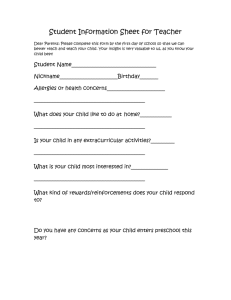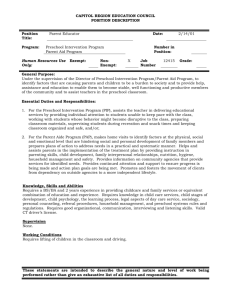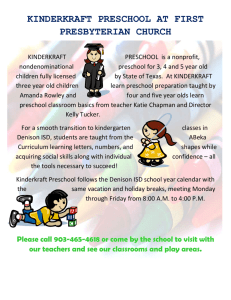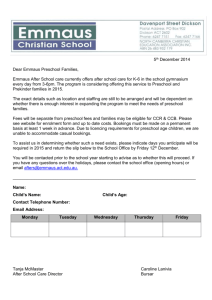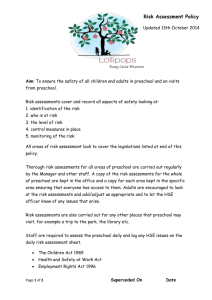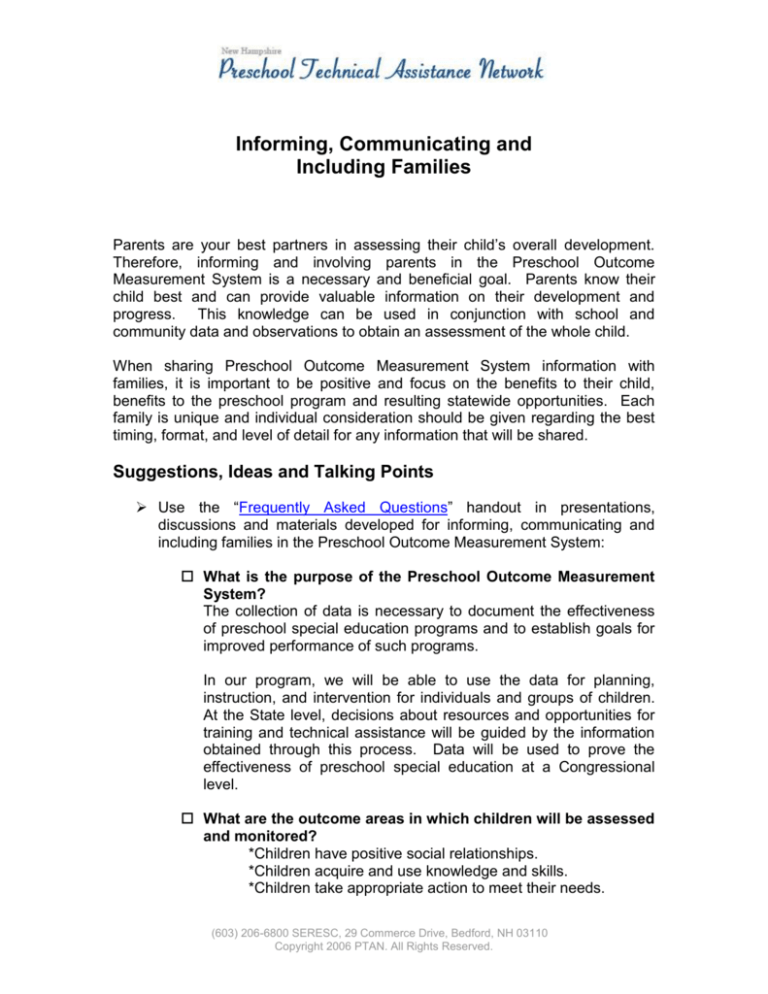
Informing, Communicating and
Including Families
Parents are your best partners in assessing their child’s overall development.
Therefore, informing and involving parents in the Preschool Outcome
Measurement System is a necessary and beneficial goal. Parents know their
child best and can provide valuable information on their development and
progress. This knowledge can be used in conjunction with school and
community data and observations to obtain an assessment of the whole child.
When sharing Preschool Outcome Measurement System information with
families, it is important to be positive and focus on the benefits to their child,
benefits to the preschool program and resulting statewide opportunities. Each
family is unique and individual consideration should be given regarding the best
timing, format, and level of detail for any information that will be shared.
Suggestions, Ideas and Talking Points
Use the “Frequently Asked Questions” handout in presentations,
discussions and materials developed for informing, communicating and
including families in the Preschool Outcome Measurement System:
What is the purpose of the Preschool Outcome Measurement
System?
The collection of data is necessary to document the effectiveness
of preschool special education programs and to establish goals for
improved performance of such programs.
In our program, we will be able to use the data for planning,
instruction, and intervention for individuals and groups of children.
At the State level, decisions about resources and opportunities for
training and technical assistance will be guided by the information
obtained through this process. Data will be used to prove the
effectiveness of preschool special education at a Congressional
level.
What are the outcome areas in which children will be assessed
and monitored?
*Children have positive social relationships.
*Children acquire and use knowledge and skills.
*Children take appropriate action to meet their needs.
(603) 206-6800 SERESC, 29 Commerce Drive, Bedford, NH 03110
Copyright 2006 PTAN. All Rights Reserved.
What is the difference between my child’s IEP goals and the
outcome areas?
IEP goals are individualized to student needs. The outcomes have
been established at the Federal level as indicators of effectiveness
of preschool special education programs. These outcome areas
are expectations for all young children regardless of special needs.
Your child may or may not have identified needs in the outcome
areas.
How will our district begin this process?
As of 11/1/06, all newly identified children with an IEP will be
required to have an assessment for Federal reporting purposes.
Information must be reported within six weeks of the start of the
child’s IEP. This initial assessment will be the foundation for
measuring future progress.
What is the role of the family in the outcomes measurement
system?
It is always important to view a preschool child’s performance
across environments. Families have important information about
their child’s strengths, challenges and overall progress, and we will
continue to ask for your input. We will share the information that
we gather about your child as we have in the past.
How often will you be assessing my child?
For the purpose of the Preschool Outcome Measurement System,
assessments on the three outcome areas will occur annually.
Additional assessments may be needed to address individual
student needs and would require your written permission. Ongoing monitoring of your child’s progress in reference to his or her
IEP goals and objectives will continue.
What assessment tool(s) will the school district be using?
The type of the assessment used may vary based on your child’s
profile and district practice.
Both criterion-referenced and
curriculum-based assessments will meet the requirement. Your
preschool special education coordinator can give you specific
information on assessments used with your child.
What happens if a child is only in the preschool special
education program for a very short time?
Only children who receive special education services for at least six
months will be included in the Preschool Outcome Measurement
System.
(603) 206-6800 SERESC, 29 Commerce Drive, Bedford, NH 03110
Copyright 2006 PTAN. All Rights Reserved.
What happens to the data from the assessment?
The data will be reported to the NHDOE without identifying
information. The district has always had a reporting requirement to
the NHDOE, which includes providing data without identifying
information. This new system will continue to protect the
anonymity/confidentiality of individuals.
How will the data collected be used?
Individual child data will be collected at a district level and shared
with NH Department of Education (NHDOE). NHDOE will group all
district data to report on NH to the Office of Special Education
Programs (OSEP) and on to Congress. Ultimately, the State will
report on the performance of NH preschool special education
programs as a whole, and will establish statewide targets for
continued effectiveness and improvement.
My child is transitioning from ESS to Preschool Special
Education, why aren't you using the outcome exit data from
that program as entry data for your program?
Assessment of infants and toddlers is different than assessments
for preschool age children. These assessments look at different
skills and different expectations.
Why are you assessing my child within six weeks of his
beginning to receive services?
The six-week time frame was selected to allow enough time for
children and staff to get to know each other, but not have so much
time in the program that the entry data reflects the benefits your
child will recieve from participating in special education. The
benefits of special education will be reflected in the exit data.
Send or hand-deliver a letter explaining the outcome measurement
system (Sample Letter to Parents).
Embed discussion of preschool outcome information in regularly
scheduled events for parents (parent meetings, training events, open
houses, etc.).
Create a video/DVD presentation featuring their children in the classroom
setting with staff they know, and highlight how these outcomes are being
addressed on an on-going basis.
Provide a workshop, roundtable discussion opportunity, and/or coffee club
meeting on preschool outcome related issues (i.e., assessment tool,
curriculum, observation skills, family role in assessment, data collection).
Offer a phone call or meeting to talk to individual families who cannot
attend meetings to discuss preschool outcomes.
(603) 206-6800 SERESC, 29 Commerce Drive, Bedford, NH 03110
Copyright 2006 PTAN. All Rights Reserved.
Sample Scenarios and Strategies
After adjusting the Sample Letter to Parents to better meet the needs of the
families in our community, our team decided to include families in on-going child
observations/data collection by providing them access to their child's record on
Creative Curriculum.net. We set up a time to offer 'family training' on use of
Creative Curriculum.net. This strategy should enable us to get more information
on how children are progressing across environments.
We used some of our additional entitlement funds to purchase a computer for
family use at the center. Families will be able to log on to their child's record and
input additional data on their child's progress.
We've been very mindful as we share information with families to be senstive to
each family's needs and preferred style of communication. We have been
cautious in our discussions to focus on what we observe the child doing, and
what the next steps we might expect for this child instead of comparing each
child's data to what a "typical" child would be doing at this age. We hope that this
strategy will result in improved communication between our families and team
members.
(603) 206-6800 SERESC, 29 Commerce Drive, Bedford, NH 03110
Copyright 2006 PTAN. All Rights Reserved.



